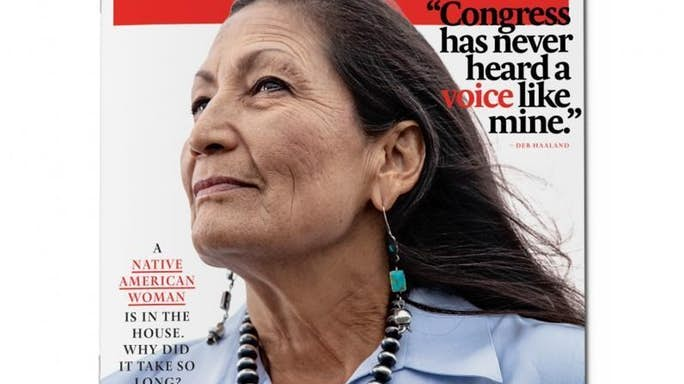
Why Senate Republicans Fear Deb Haaland
Julian Brave NoiseCat / The Washington Post
WASHINGTON, DC (February 28, 2021) — Alexander Stuart, the third interior secretary, once declared that the United States’ mission was to “civilize or exterminate” native people.
The Interior Department has done much to carry out that terrible mission, with the seizure of tribal lands, forced assimilation of Native American children and much more. So it is impossible to overstate the significance — particularly to Native Americans — of the fact that President Biden has nominated a Native American woman, New Mexico Rep. Deb Haaland, to head the department that manages much of the land and resources taken from native nations and maintains relationships between those nations and the U.S. government.
If confirmed, Haaland would not only be the first Native American to serve as interior secretary — she would also be the first Native American Cabinet secretary.
At her confirmation hearing this week, Haaland, a tribal citizen of the Laguna Pueblo, introduced herself in her family’s Keres language, which today has only 13,000 speakers. She acknowledged that the land upon which the hearing was taking place once belonged to the Piscataway people — a rebuke of Stuart and the countless politicians and bureaucrats who dedicated themselves to the cause of Indigenous annihilation.
“The historic nature of my confirmation is not lost on me,” she said. Indeed, we have had many interior secretaries with close ties to powerful men in the C-suite and on Capitol Hill. But we have never had an interior secretary who tended to traditional gardens, cooked for pueblo feast days and stood with the Oceti Sakowin Nation at Standing Rock in defense of tribal treaty rights.
Perhaps as a consequence, Haaland’s nomination has proved particularly contentious, as Republican senators, many from Western states, used the hearing to attack, sometimes with remarkable animosity, what they misleadingly portrayed as her extreme views on fossil fuels and national parks.
Wyoming Sen. John Barrasso, the senior Republican on the Senate Energy and Natural Resources Committee, shouted over Haaland, accusing the congresswoman of wanting to legalize drugs to replace tax revenue from oil and gas. (Haaland backed legalizing and taxing cannabis as a congresswoman, but never advocated doing so instead of taxing fossil fuels.)
Montana Sen. Steve Daines — who, like Barrasso, has received more than $1 million in campaign contributions from oil and gas companies — demanded Haaland retract a tweet stating that “Republicans don’t believe in science.” (In 2019, Daines said, “To suggest that [climate change] is human-caused is not a sound scientific conclusion.”)

Utah Sen. Mike Lee expressed his dissatisfaction with the designation of Bears Ears as a national monument, asking whether Haaland thought it was “appropriate for stakeholders, people who have some sort of economic interest in the land or some sort of connection to the land … to be involved in the national monument designation process.” Lee was apparently unaware that the nominee’s Pueblo relatives are among the tribes that consider Bears Ears a sacred place, tracing their connections to the land to time immemorial.
Haaland appeared unperturbed. We Indians, after all, are well-practiced in the art of accommodating and poking fun at our antagonists; we’ve been doing it for hundreds of years. When Daines asked the secretary-designate why she co-sponsored a bill protecting grizzly bears in perpetuity, Haaland responded with forthright charm: “I imagine, at the time, I was caring about the bears.”
Conservatives have portrayed Haaland as a divisive partisan, but in 2019, she introduced the most bills with bipartisan support of all House freshmen. On Tuesday, Republican Rep. Don Young of Alaska — a conservative congressman from an oil state — introduced Haaland as a strong nominee and friend who works across the aisle and whose perspective as a native person is needed at Interior. “Anyone who thinks we’re going to call off fossil fuels immediately is smoking pot,” he added — a rebuke to environmentalists, yes, but also to his colleagues in the upper chamber.
What Haaland actually brings — and what the Republican Party seems to consider so dangerous — are experiences and perspectives that have never found representation in the leadership of the executive branch. In fact, Republicans’ depiction of the first Native American ever nominated to the Cabinet as a “radical” threat to a Western “way of life” revealed something about the conservative id: a deep-seated fear that when the dispossessed finally attain a small measure of power, we will turn around and do to them what their governments and ancestors did to us.

This is not, in fact, some sort of continent-size conquest in reverse — but Republicans should fear antagonizing Native American voters. These Americans played crucial roles in the 2020 election on both sides of the aisle: Menominee and Navajo voters helped Democrats win Wisconsin and Arizona’s electoral votes, as well as the latter state’s Senate seat. Meanwhile, Donald Trump held North Carolina in part by promising members of the Lumbee tribe federal recognition.
In 2022, Republicans will look to defend or pick up Senate seats in all of those states and more. Some, such as Alaska Sen. Lisa Murkowski, who was adopted by a Tlingit clan and who rode the Indigenous vote to a historic write-in victory in 2010, cannot win without native support. Native voters tend to prefer the Democratic Party, but not nearly as much as other racial groups do. As Democrats nominate the first Native American Cabinet secretary, and as Republicans line up to try to stop her, that partisan balance could be changing.
With moderate Democrat Joe Manchin III of West Virginia publicly backing Haaland, her path to confirmation is clear. It would be unwise for the GOP to stand athwart Indian country’s chance at history.
Posted in accordance with Title 17, Section 107, US Code, for noncommercial, educational purposes.